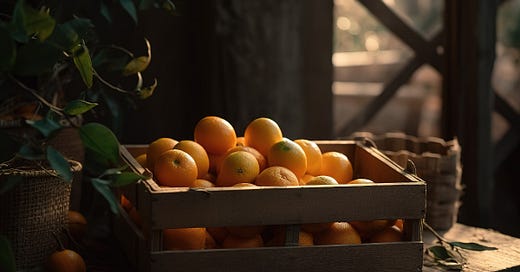Mama stacks the babies in orange crates, out back. She keeps ‘em dry in hessian sacks and packs ‘em tight, sometimes three to a crate, sometimes only two. Mama says that stops ‘em wailing too much and wakin’ the whole goddamn neighbourhood.
Some of the babies ain’t ripe yet, their skin mottled green. Others are good and done, pink-plump, blossom sweet, with long green stalks and waxed leaves curling from their fuzzy fontanels. One or two get a little overripe from sittin’ out too long – usually cos Mama got disturbed by dumb sons-of-bitches callin’ on the telephone – but Mama says those ones deserve love just the same, and she puts ‘em right on the top of the stack.
At harvest time, folk come from all around. They throw crisp clean dollars into the rusted can on the porch, then they gotta wait ‘til Mama’s good and ready to come and take care of business. Sometimes hours, sometimes days, depends how Mama’s feelin’. She says you can’t grow a baby half-assed. They ripen in their own good time.
We get all kinds. Weather-worn women clutchin their purses with twisting hands, men in overalls with grey-streaked beards and bruised eyes, glossy supermodel types – all tight smiles and polished nails – as if they can’t believe it’s come to this. They throw their money in the can, just the same as everbody else.
Mama brings the folks round back and lets ‘em take in the rows and rows of orange crates. Pick the ones from the top, she says, others ain’t done yet. But still, they lift the crates to see what’s underneath, always wanting something better than what’s right in front of ‘em.
They sneak a glance at Mama, sittin’ in her old lawn chair by the gate, almost-sleeping. She waits ‘em out. I ain’t choosing for no one, she says, let ‘em do their own dirty work.
When they’re gone, Mama takes the dollars from the can and stuffs ‘em in her overall pocket. She fills the can with water and sprinkles the babies in the orange crates. She tucks ‘em tightly back into the hessian sacks and soothes the ones that wail. Then she takes the crates from the top, places them carefully on the dusted ground and checks the ones underneath for spoilin’. She trims stalks, prunes leaves, and sings soft songs her mamma taught her, and her mama before that.
I ask her – while she prunes and trims – what will they be, Mama, all these babies? What will they become?
Mama squints her good eye and says, hard to tell, can’t never know. Some good, some bad. Some Tiger Lilies, some Maine Coon cats, some maple leaves. Some of ‘em gon’ be real sweet red-headed girls with freckles on their cheeks, others gon’ grow fox pelts and run pawn shops, with poker out back. Some might come up strong, make their mark on the world, be birds of paradise or basketball players. Others gon’ be whiskey breath and burn like barbecue coals. She sighs, real heavy. Ain’t for me to know or say.
Mama puts the rusted can aside and takes a pack of smokes from her overalls. She looks out over the rows and rows of orange crates, goes in on herself, and smokes awhile.
When the shadows fall and the babies’ slumber in the cool dusk air, dumb dog slinks across the yard and brushes up against her to remind her to fix supper.
We go inside, eat quietly, ignoring the phone that rattles and rattles on the wall. Mama shakes her head. When these folks gon’ learn? Can’t choose down the goddamn telephone.
After supper, Mama pulls the dollars from her pocket and I count ‘em out into thick piles on the kitchen table. Mama shakes her head when I tell her how much. I don’t know why these folks don’t grow their own, she says, all you need is a little rainwater and a few goddamn orange crates. Dumb dog whines for scraps. Mama scuffs his ears, stretches out her tired back and gets up to clear the plates.
I suck my segment fingers, letting the sweet juice run down my chin, and idly wonder why, out of all those rows and rows of orange crates, Mama chose me.
Author: Kathy Hoyle’s work has appeared in publications such as The Forge, Lunate, Emerge Literary Journal, Ellipsis Zine, Reflex Fiction, and The South Florida Poetry Journal. She lives in a sleepy Warwickshire village and when she’s not writing, she spends her time singing Dolly Parton songs to her long-suffering labradoodle, Eddie.
If you have enjoyed this story, please consider making a donation to our free-to-read literary journal.




